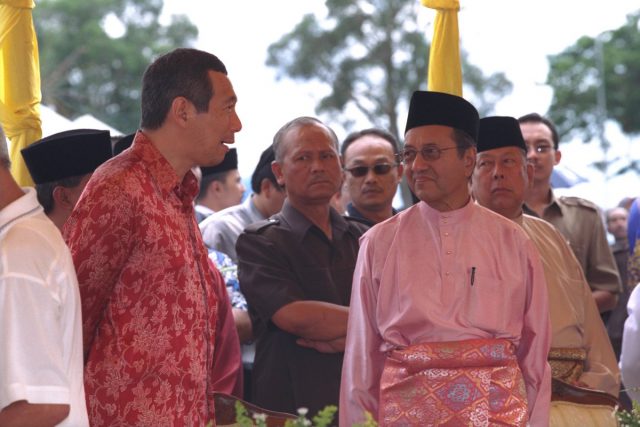
The joke of the week in Singapore:
A Singapore man goes to bed in May 1988 and sleeps for three decades. In May 2018, he awakes to be astonished by the length of his beard and the age of his wife. His grown children are called and the grandchildren introduced. Then he asks, ‘Who is Singapore’s leader now?’
When told that it’s Prime Minister Lee, he muses: ‘I knew LKY would never go away. What about Malaysia?’
Malaysia’s leader is Dr Mahathir.
The awakened one shakes his head: ‘Still Lee and Mahathir! I’m going back to sleep. Wake me up when something changes around here!’
In one version of the joke, the punch line has a coda:
The eldest son steps forward and says, ‘Don’t go back to sleep Dad, everybody else has just woken up too!’
Singapore ‘looks like a major metropolis, but remains a small island at heart’ and the small island is agog and agape at the stunning events across the causeway.
Malaysia’s political tsunami on 9 May isn’t just making history, but is rearranging how history is understood.
Dr Mahathir Mohamad’s place in history is being re-made at speed. Malaysia’s fourth and longest-serving prime minister (1981–2003) is now its seventh PM. And the seventh PM has pledged to undo much of the fourth PM’s institutional legacy while trying simultaneously to defend his personal legacy.
The sleeper joke chimes with me because when I arrived in Singapore as the ABC’s Southeast Asia correspondent in January 1989, there was a lot of speculation about the leadership succession timetables for those two entrenched leaders, Mahathir and Lee Kuan Yew.
In 1989, Dr M had just had a heart-bypass operation. Leaving aside wry surprise in KL that Mahathir actually had a heart, how much longer could he go? Well, that bypass lasted 18 years before Dr M had another bypass. He’s also had a few heart attacks. Whatever the state of his heart, the defining feature of the oldest national leader in the world is his will to power.
Back in 1989, Lee Kuan Yew had a succession plan for his son, Lee Hsien Loong, just as he had a success scheme for Singapore. LKY stepped down as leader in 1990, handing the prime ministership to Goh Chok Tong. But Lee stayed in cabinet—and stayed as the power monitoring the power. In 1990, LKY’s agonising choice between beloved country and beloved son was made in favour of the beloved country. The beloved son had to wait a further 14 years before he became the third prime minister of the beloved country.
Today Prime Minister Lee, like his father, is edging slowly towards that moment when he hands control of the family business to someone who isn’t a family member. The choice of Singapore’s fourth prime minister will be made, as always, by a Lee. Dynasties and democracies, though, are a volatile mix.
Asia well understands that dynasties in business or politics can be a major force multiplier—until that moment when the dynastic line falters or overreaches.
The case in dramatic point today is Najib Razak, the defeated Malaysian prime minister. Najib, too, is the son of a prime minister, so the born-to-rule sensibility of dynastic inheritance was added to the hubris of leading the party in power for 61 years.
In taking up the reins again, Mahathir is giving Singapore some characteristic flicks. The biggest lash of the whip is Dr M’s decision to scrap the deal to build a high-speed railway between Singapore and Kuala Lumpur.
The sharpest reminder of Mahathir’s sardonic force, delivered via a Financial Times interview, was his taunt about what Malaysia’s revolution will mean in Singapore: ‘I think the people of Singapore, like the people in Malaysia, must be tired of having the same government, the same party since independence.’
Discard the old memories of Mahathir as the champion of distinctive Asian values, of strong government based on hierarchy and respect. That’s all so last century. Meet today’s Mahathir, the champion of democracy in all its glorious unpredictability.
Singapore has a long history of dealing with Mahathir, and his character certainly hasn’t changed. But this is Mahathir intent on dismantling much of the history he created.
Part of the strange symbiosis of Malaysia and Singapore was that neither democracy ever voted to change its soft-authoritarian government. That mirror image of a party holding permanent power has shattered.
Mahathir is back. How much longer can Lee stay?

